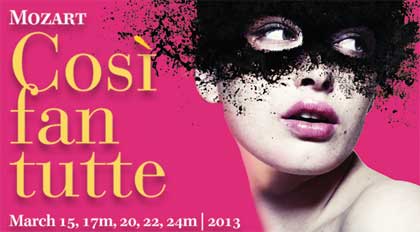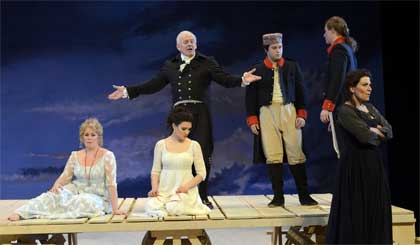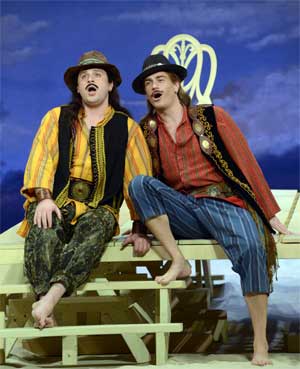Opera (1790)
by Wolfgang Amadeus Mozart
Libretto by Lorenzo da Ponte
English Translation by Marmaduke E. Browne, revised by John Cox
Boston Lyric Opera
Citi Performing Arts Center / Shubert Theatre
Boston, MA
March 15, 17m, 20, 22, 24m, 2013
Conductor: David Angus
Stage Director: Thomas Allen
Set Designer: John Conklin
Costume Designers: John Conklin and Gail Astrid Buckley
Lighting Designer: Marcus Dilliard
Wig and Makeup Designer: Jason Allen
With Paul Appleby (Ferrando), Matthew Worth (Guglielmo), Thomas Allen (Don Alfonso), Caroline Worra (Fiordiligi), Sandra Piques Eddy (Dorabella), Phyliis Pncella (Despina)

Guglielmo is bethrothed to Fiordiligi and Ferrando is betrothed to her sister, Dorabella. Contending the utter faithfulness of their prospective mates to the older, more cynical Don Alfonso, they enter into a wager. By its terms, they are to obediently follow Don Alfonso’s directives. Alfonso, in cahoots with Despina, the attendant of the sisters, concocts a scheme by which the male suitors pretend to go off to war. Disguised, they are to return as Turks who will proceed to energetically try to seduce the sisters, supported by all kinds of chicanery managed by Don Alfonso and Despina. Ferrando and Guglielmo enter the ruse, confident that their mates will resist all advances, but, as they pursue their new roles, wills start to falter and hearts to break.
In the guise of this seemingly trivial story, Mozart delivers some of his greatest music.
Così is Mozart’s third to last opera (just before La Clemenza di Tito (September, 1791) and The Magic Flute (October, 1791)) and his capacities show themselves in full force. This deceptively trivial story also comes with a great libretto by Lorenzo da Ponte, who also produced the libretti for two of Mozart’s other greatest operas, La Nozze di Figaro (1786) and Don Giovanni (1787).
I cannot say enough good things about this wonderful production.
Opera die-hards should know that the libretto used in this production is in English. Not knowing that beforehand, I was taken aback and a bit distraught when they started to sing, but soon came fully around. The translation is delightful and adds an entirely new dimension to this great classic, written originally, and usually performed, in Italian. This English libretto, by Marmaduke E. Browne and revised by John Cox, is so well done that its wit and articulateness replace whatever feeling of loss one might have from not hearing the Italian version.
The set here is simple but totally inventive. The scene is a beach, and there is real sand onstage. At various points, Don Alfonso sits downstage on a beach chair. At another point, someone makes a little sand sculpture. There are various small backdrops that come down at various times, simple, but artfully conceived and arranged.
A beautifully elaborate contraption, fully of pipes and tubes, appears during the scene in which Despina, as a healer specializing in Mesmerism, tries to revive the collapsed suitors.
The costumes play in lively colors and arrays against the spareness of the set; together they function very well.
This is a model of an economical production that really works.
All of the singing is spectacular.

Sir Thomas Allen (Don Alfonso),
Paul Appleby (Ferrando), Matthew Worth (Guglielmo),
Phyllis Pancella (Despina)
in “Così Fan Tutte”
Photo: Eric Antoniou
Courtesy Boston Lyric Opera
Thomas Allen, who plays Don Alfonso, is a Metropolitan Opera veteran whose resonant baritone exudes a relaxed confidence. As well, he lends his considerable talents as stage director to this dramatically compelling production.
The two suitors, Paul Appleby (Ferrando) and Matthew Worth (Guglielmo) are a wonderful pair. I was warned that one of them had a cold, but, for the life of me, I do not know which of them it could have been because their singing was so uniformly good.
Caroline Worra as Fiordiligi has a fabulous couple of arias in which she wrestles with her own passions and fidelities; she carries this off lyrically and compellingly.
Sandra Piques Eddy as Dorabella has a wonderfully rich mezzo that is like soft velvet, particularly in its lower registers. She is also a great actress, conveying with subtle body language and gesture a whole range of comedic and dramatic emotions.
Phyllis Pancella as Despina is not only a great singer, but hysterically funny as well. She puts on some gag accents in the parts in which she has to play the role of a wedding magistrate and a healer and she completely breaks up the audience with her schtick.

Matthew Worth as Guglielmo
in “Così Fan Tutte”
Photo: Eric Antoniou
Courtesy Boston Lyric Opera
The orchestra, led by David Angus, played in fine form. Though convening only for several productions during the year, one must marvel at their capacity as an ensemble to rise so capably to the signficant instrumental demands of this great, but delicate and exposed, music. They do a remarkably good job.
There is something delightful about seeing Così, which one might conceive as a kind of chamber opera, in a small theatre rather than at a larger venue like New York’s Metropolitan Opera House. The immediacies of the gags and humor, and the intimacies of the poignancies, come through vividly here.
If you love opera, if you love Mozart, and especially if, as I do, you love Così fan tutte, run, don’t walk, to see this fabulous production.
– BADMan
Leave a Reply